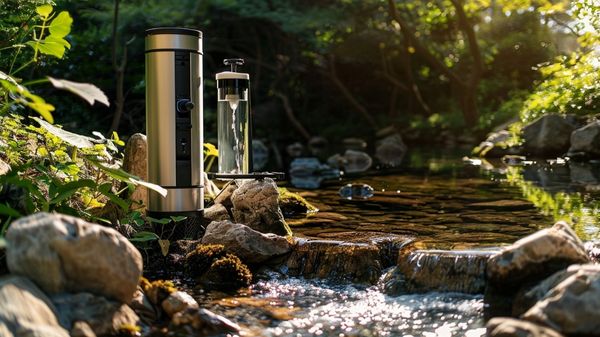Are you tired of high energy bills and want to make your off-grid house more efficient? Look no further! In this article, we will explore 7 proven techniques to boost off-grid house efficiency.
Imagine a scenario where you have installed solar panels, upgraded to energy-efficient appliances, and implemented water conservation methods.
With passive heating and cooling systems, insulation, weatherization techniques, smart energy management systems, and sustainable building materials, you can transform your off-grid house into a model of energy efficiency.
Solar Panel Installations
To maximize energy production, utilize the optimal number of solar panels for your off-grid house. Solar panel installations are a key aspect of creating an efficient and sustainable off-grid energy system.
When it comes to solar panel maintenance, regular cleaning and inspection is crucial to ensure optimal performance. Keep an eye out for any debris or shading that may affect the panels’ efficiency.
Additionally, understanding the financing options for solar panel installations is essential. Many governments and organizations offer incentives and grants to help offset the initial costs. Explore different financing options such as loans or leasing agreements to make solar panel installations more affordable.
Investing in proper maintenance and exploring financing options won’t only maximize your energy production but also ensure the longevity and efficiency of your solar panel system.
Energy-Efficient Appliances
Looking to increase the energy efficiency of your off-grid house? Consider investing in cost-effective appliance options that prioritize energy savings.
From refrigerators and washing machines to air conditioners and light bulbs, there are various energy-efficient options available in the market.
Additionally, implementing simple energy-saving tips and tricks, such as using power strips, adjusting thermostat settings, and properly maintaining appliances, can further reduce your energy consumption and increase overall efficiency.
Cost-Effective Appliance Options
You can increase the efficiency of your off-grid house by choosing cost-effective appliance options, such as energy-efficient appliances.
When it comes to lighting, opt for energy-efficient lighting options like LED bulbs, which consume less energy and last longer than traditional incandescent bulbs. These bulbs are available in a variety of styles and can be used throughout your off-grid house.
Additionally, consider utilizing renewable power sources to power your appliances. Solar panels or wind turbines can generate clean and sustainable energy, reducing your reliance on traditional power sources.
Energy-Saving Tips and Tricks
Boost your off-grid house efficiency with energy-saving tips and tricks, including the use of energy-efficient appliances. Here are four ways you can optimize your energy consumption and reduce your carbon footprint:
- Switch to energy-efficient lighting: Replace traditional incandescent bulbs with LED or CFL bulbs. These bulbs use significantly less energy and last longer, saving you both electricity and money.
- Invest in home automation: Install smart thermostats, power strips, and smart plugs. These devices allow you to control and monitor your energy usage remotely, optimizing energy consumption and reducing wastage.
- Choose energy-efficient appliances: When purchasing new appliances, look for the Energy Star label. Energy Star certified appliances meet strict energy efficiency guidelines, saving you up to 50% on energy costs compared to non-certified models.
- Unplug unused electronics: Many appliances and devices consume energy even when they’re turned off. Unplugging them when not in use can help you eliminate ‘vampire’ or standby power consumption.
Water Conservation Methods
To maximize the efficiency of your off-grid house, implementing water conservation methods is essential.
One effective method is rainwater harvesting, which involves collecting rainwater from your roof and storing it for later use. This water can be used for various purposes such as watering plants, flushing toilets, and even washing clothes. By utilizing rainwater, you can reduce your reliance on the grid and conserve precious freshwater resources.
Another method is greywater recycling, which involves reusing water from sinks, showers, and laundry for irrigation or toilet flushing. Greywater can be treated and filtered to remove impurities before being reused, reducing the need for fresh water.
Passive Heating and Cooling Systems
Passive heating and cooling systems optimize the temperature regulation of your off-grid house. By harnessing the power of nature, you can reduce your reliance on traditional heating and cooling methods, saving energy and money in the process. Here are four effective techniques to consider:
- Geothermal heating: Utilize the stable temperature of the earth to heat your home. Geothermal systems use underground pipes to circulate air or liquid, transferring heat to or from the ground.
- Natural ventilation: Take advantage of natural airflows to cool your home. Properly placed windows, vents, and fans can create a cross breeze, promoting air circulation and reducing the need for air conditioning.
- Thermal mass: Incorporate materials with high heat capacity, such as concrete or stone, into your home’s design. These materials absorb heat during the day and release it at night, helping to regulate indoor temperatures.
- Insulation: Ensure your home is well-insulated to minimize heat loss in the winter and heat gain in the summer. Effective insulation keeps your home comfortable and reduces the need for heating or cooling systems.
Implementing these passive heating and cooling techniques can significantly improve the efficiency of your off-grid house, making it more comfortable and sustainable throughout the year.
Insulation and Weatherization Techniques
One effective way to enhance the energy efficiency of your off-grid house is by implementing insulation and weatherization techniques.
Proper insulation helps to create a barrier that prevents heat transfer between the inside and outside of your home, reducing the need for excessive heating or cooling.
To achieve this, you can start by air sealing your home, which involves sealing any gaps or cracks in the walls, windows, and doors to prevent air leakage. This not only helps to keep your home comfortable but also prevents energy wastage.
Additionally, addressing thermal bridging is crucial in improving insulation. Thermal bridging occurs when there’s a gap or weak spot in the insulation, allowing heat to escape or enter your home. By identifying and addressing these areas, you can significantly improve the overall energy efficiency of your off-grid house.
Smart Energy Management Systems
To optimize your off-grid house’s energy efficiency, consider implementing smart energy management systems.
Start by investing in energy-saving appliances that are designed to consume less power without sacrificing performance.
Additionally, integrate solar power into your system to harness renewable energy and reduce your reliance on the grid.
Lastly, install a remote energy monitoring system that allows you to track and manage your energy usage from anywhere, ensuring you always stay in control of your off-grid power consumption.
Energy-Saving Appliances
Invest in energy-saving appliances to optimize your off-grid house’s efficiency. By incorporating these smart energy management systems, you can significantly reduce your energy consumption and enhance sustainability.
Here are four essential energy-saving appliances to consider:
- Energy-saving lighting: Replace traditional incandescent bulbs with LED or CFL lights. These bulbs use up to 75% less energy and last significantly longer, reducing the need for frequent replacements.
- Smart thermostats: These devices allow you to control heating and cooling remotely, ensuring optimal temperature settings while minimizing energy wastage. They learn your preferences and adjust accordingly, saving energy and money.
- Energy-efficient appliances: When purchasing new appliances, look for ENERGY STAR certified products. These appliances are designed to use less energy without compromising performance.
- Eco-friendly insulation: Proper insulation helps maintain a comfortable temperature inside the house, reducing the need for excessive heating or cooling. Choose insulation materials that are eco-friendly and provide excellent thermal resistance.
Investing in these energy-saving appliances won’t only save you money in the long run but also reduce your carbon footprint, making your off-grid house more efficient and sustainable.
Solar Power Integration
Maximize the efficiency of your off-grid house by integrating solar power into your smart energy management systems. By harnessing the power of the sun, you can reduce your reliance on traditional energy sources and save money in the long run.
One key aspect of solar power integration is the ability to store excess energy generated during the day for use during the night or on cloudy days. This is where solar power storage comes into play. By investing in a high-quality solar battery system, you can store the excess energy and use it when needed, ensuring a continuous supply of power for your home.
Additionally, many governments and energy companies offer solar power incentives, such as tax credits or rebates, to encourage homeowners to adopt renewable energy sources. By taking advantage of these incentives, you can further reduce the cost of installing and integrating solar power into your off-grid house.
Remote Energy Monitoring
By implementing remote energy monitoring systems, you can effectively track and manage your off-grid house’s energy consumption. These smart energy management systems offer a range of benefits that can significantly improve the efficiency of your off-grid power generation.
Here are four reasons why remote energy monitoring is essential for off-grid homeowners:
- Real-time data: Remote energy monitoring systems provide you with instant access to real-time data on your energy usage. This allows you to identify any inefficiencies and make adjustments accordingly.
- Energy optimization: With remote energy monitoring, you can optimize your energy usage by identifying peak demand periods and adjusting your consumption accordingly. This helps you avoid overloading your system and maximize the efficiency of your off-grid power generation.
- Cost savings: By closely monitoring your energy consumption and making informed decisions, you can reduce your reliance on external power sources and save on electricity costs in the long run.
- Troubleshooting: Remote energy monitoring systems can also help you quickly identify any issues or malfunctions in your off-grid power system. This allows you to address problems promptly and minimize downtime.
Implementing remote energy monitoring is a practical and efficient way to ensure optimal performance and efficiency for your off-grid house’s power generation.
Sustainable Building Materials
When building an off-grid house, it’s important to use sustainable building materials. By using renewable energy sources and eco-friendly construction materials, you can minimize your environmental impact and create a more sustainable living space.
One popular option is to use reclaimed or salvaged materials, such as reclaimed wood or recycled metal, which reduces the demand for new resources.
Another option is to choose materials that are locally sourced, reducing transportation emissions.
Additionally, using materials with low embodied energy, such as straw bales or rammed earth, can significantly reduce the carbon footprint of your building.
Lastly, consider using materials that are non-toxic and have low VOC (volatile organic compound) levels, ensuring a healthier indoor environment.
Conclusion
Congratulations on taking the first steps towards a more sustainable and efficient off-grid house! By implementing solar panel installations, energy-efficient appliances, water conservation methods, passive heating and cooling systems, insulation and weatherization techniques, smart energy management systems, and sustainable building materials, you aren’t only reducing your carbon footprint, but also saving money in the long run.
Keep up the great work and become a trailblazer in the future of off-grid living. Remember, every little action counts towards a brighter and greener tomorrow!




